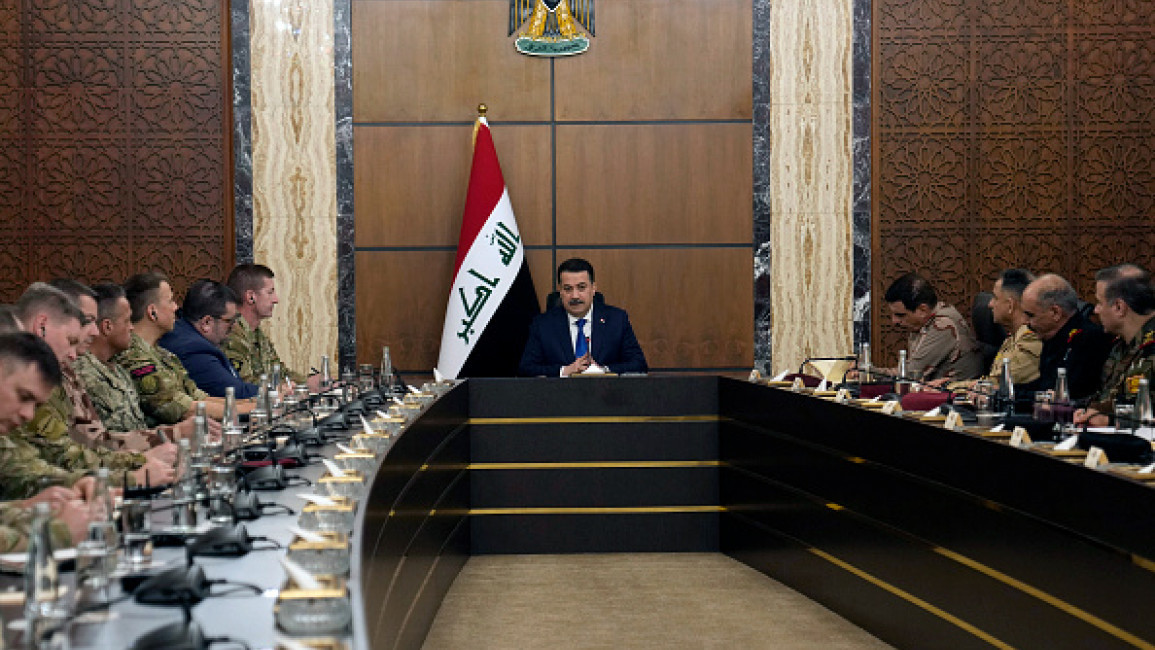Iraq's parliament pushes for US-led coalition troop withdrawal amid rising tensions
Iraq's parliament is pushing for a law mandating the withdrawal of the US-led coalition troops from the country in light of a series of attacks on Iran-backed militias.
The Joint Military Technical Committee between Iraq and the US is scheduled to reconvene on Sunday to discuss a timetable for the withdrawal of the coalition from the country.
Iraq's parliament on Saturday held a session which condemned the recent US airstrikes against Iraqi militias aligned with Iran, however, the session was marked by the absence of most Sunni and Kurdish lawmakers.
The move came after a US drone strike killed Abu Baqir al-Saadi, a top commander from the Iran-backed Kataib Hezbollah in eastern Baghdad.
Following the session, Speaker Mohsen Al-Mandalawi, from the ruling Shia Coordination Framework, directed the legislator’s legal and defence committees to discuss a petition signed by more than 100 lawmakers demanding the expulsion of foreign forces from Iraq, according to a statement by the parliament’s media office.
Mandalawi also ordered the formation of a parliamentary committee to monitor and support Prime Minister Mohammed Shia al-Sudani’s negotiations with the US to end the advisory mission of the anti-IS international coalition forces.
"The Acting Speaker of the Parliament expressed the council's rejection and condemnation of any attacks on Iraq from any party, under any pretext, and denounced the American attacks targeting the Popular Mobilization Forces and its leaders," the statement said.
"He called on the government to take the necessary measures to protect Iraq's security," the statement added. "The parliament supports the government in diplomatic efforts to prevent the targeting of Iraqi territory and ensure adherence to international agreements."
Mandalawi also emphasised Iraq's role in stabilising both the international and regional contexts, urging the government to implement the Parliament's Resolution No. 18 from 2020, which demands the withdrawal of foreign forces from Iraq.
Washington has some 900 troops in Syria and 2,500 in Iraq as part of an international coalition against the Islamic State group.
The US troops are based in Iraq upon a request from the Iraqi government to assist and advise the Iraqi security forces to combat the IS insurgency.
The parliament has indicated that the withdrawal of the coalition forces would "be based on the improvement of Iraqi security capabilities and the absence of any new agreements necessitating the presence of foreign forces".
Yahya Rasool, the military spokesperson of Iraq's prime minister Mohammed Shia Al-Sudani on 8 February said in a statement that the Joint Military Technical Committee between Iraq and the US will meet on Sunday "for the discussion and scheduling of ending the mission of the international coalition in Iraq".
The US Army’s Central Command (CENTCOM) last week said they conducted an airstrike that "killed a Kataib Hezbollah commander responsible for directly planning and participating in attacks on US forces in the region. It also vowed to continue its strikes against anyone who "threatens” the safety of the US forces.
According to Iraqi outlets, al-Saadi was responsible for Kataib Hezbollah's logistical support and missile unit.
The ruling Coordination Framework, an umbrella body for all Shia parties and groups in Iraq, on Thursday, met with PM Sudani, and urged him to continue with its efforts to end the anti-IS global coalition in Iraq.
Since the start of Israel's war on Gaza, Iran-backed militias in Iraq have carried out dozens of attacks on US forces in both Iraq and Syria over Washington's unwavering support for Tel Aviv in its brutal onslaught on the enclave.
US and allied troops have been attacked more than 165 times in the Middle East since mid-October in a campaign waged by local armed groups angered by US support for Israel in the war in Gaza.
The US strike that killed al-Saadi came days after three American troops were killed in a drone strike on a US base in northeastern Jordan, which Washington the Islamic Resistance in Iraq- a shadow name for Iran proxies in Iraq and Syria.


![President Pezeshkian has denounced Israel's attacks on Lebanon [Getty]](/sites/default/files/styles/image_684x385/public/2173482924.jpeg?h=a5f2f23a&itok=q3evVtko)



 Follow the Middle East's top stories in English at The New Arab on Google News
Follow the Middle East's top stories in English at The New Arab on Google News


